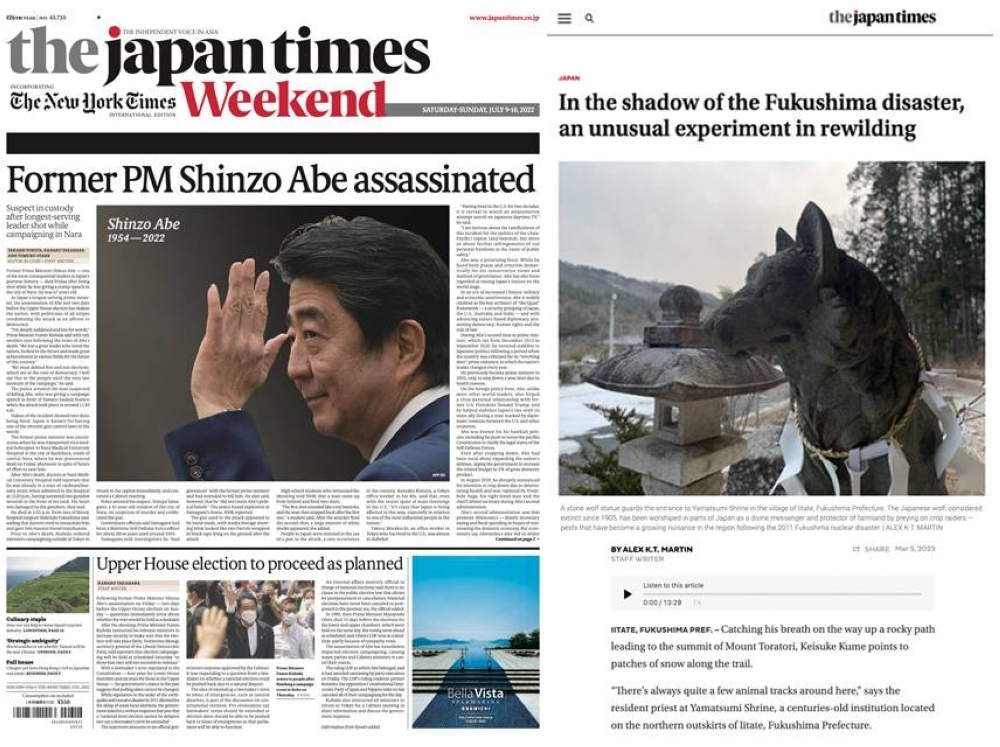Japan Times wins awards for breaking news and feature reporting

The Japan Times was recognized in two categories at the World Association of News Publishers Asian Media Awards on Friday, winning golds for breaking news coverage and feature writing in the division for small to medium outlets.
Coverage of the assassination of former Prime Minister Shinzo Abe won gold in the breaking news category.
Editors recalled that once the news of a shooting had reached a morning meeting, it was an all-hands-on-deck situation. Due to the pandemic, communication was limited to shared documents and video and text chats.
Knowing only that Abe had been injured at a campaign rally, the domestic news team, which focused five reporters and several editors on the project, collaborated from morning till night, ultimately publishing nine stories on the day of the incident, as well as many other follow-up news articles and opinion pieces in the aftermath.
As Abe’s death was not officially confirmed until late afternoon, the challenge was obtaining an accurate and impartial picture of the situation, while keeping readers updated on the latest developments.
“I remember Prime Minister Kishida talking to reporters and he appeared to have been crying already, even before confirmation that (Abe) had died,” chief of reporters Kanako Takahara said. “And that, to me, was what signaled to me, ‘Oh, this is not good.’”
In addition to reporting the facts, the team was confronted with a large amount of information coming from different sources. Verifying them in a timely manner was a large part of the news-gathering process. Lacking immediate information about the shooter, his weapon and motives, the news team had to weigh its words carefully, recalls managing editor Mark Thompson.
“We were really struggling in the early hours to identify the weapon. We had footage from social media from all these different angles and the TV was already dissecting the issue, but we were careful not to jump to conclusions,” he said.
Editor-in-chief Takashi Yokota said the feat was a result of the outlet’s strengthening of news operations in recent years.
“I can’t be more proud of our team for how everybody stepped up to cover one of the most consequential events last year,” he said. “Our coverage was a result of us combining the knowledge and experience of veterans with the agility of our younger journalists who gathered information through real and online sources.”
The article “In the shadow of the Fukushima disaster, an unusual experiment in rewilding” by Japan Times staff writer Alex K.T. Martin shared the gold for feature writing.
Martin’s story explores how wildlife in Fukushima has prospered over a decade after the area was evacuated, how locals who have since returned are learning to coexist and how humans can ultimately learn from nature’s ability to adapt.
Martin said his reporting took him to various towns and villages along the coast of the prefecture, all of which were heavily impacted by the 2011 earthquake, tsunami and resulting triple meltdown.
While reporting on local people who were returning to the prefecture, he was also pursuing another less-reported topic related to the disaster: the rewilding of Fukushima.
The piece begins with a scene from his two-day reporting trip — his arrival at dusk at a shrine that deifies that the wolf as messenger from the gods. As Martin has extensively covered the fate of the Japanese wolf, a species that has been considered extinct since 1905, he felt drawn to the topic.
“(The wolf) was sort of a long shot, but it somehow worked,” he said. “I think it turned out nicely ... The piece had urgency and it wasn’t just about the science. It included faith and religion.”
While Martin handled the research, fieldwork and writing, he said editors Chris Russell and Joel Tansey were key to shaping the piece’s final structure.
Tansey said Martin’s passion for his topic was obvious throughout the piece, and the idea itself stood out.
“(The disaster) was one of the biggest stories in Japan since the war, so, there are a lot of different angles to explore when it comes to Fukushima and 3/11,” Tansey said. “But this was a fairly unique take ... And I think there was a bit of something for every kind of reader in the piece.”
The story was published on The Japan Times’ Our Planet page, launched in December 2022 to focus on the environment and climate change.
culled from Japan Times

